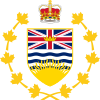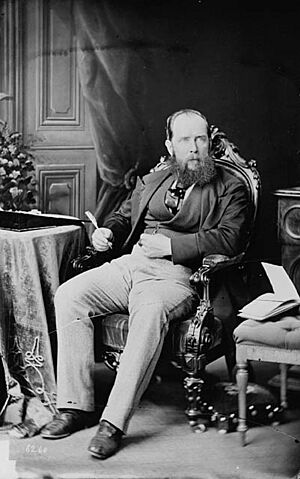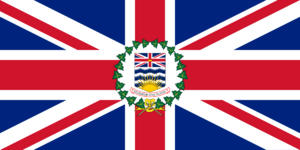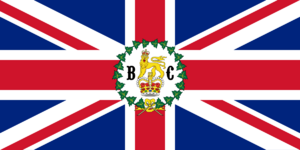Lieutenant Governor of British Columbia facts for kids
Quick facts for kids Lieutenant governor of British Columbia |
|
|---|---|

Flag of the lieutenant governor of British Columbia
|
|

Emblem of the lieutenant governor
|
|
| Viceroy | |
| Style | Her Honour the Honourable |
| Residence | Government House, Victoria |
| Appointer | The governor general on the advice of the prime minister |
| Term length | At the governor general's pleasure (usually 5 years) |
| Formation | 20 July 1871 |
| First holder | Joseph Trutch |
| Salary | $126,241/year |
The lieutenant governor of British Columbia is the King or Queen's representative in the province of British Columbia, Canada. This important role acts for the monarchy in the province. It is not a representative of the governor general of Canada.
The office was created in 1871. This happened when the Colony of British Columbia joined Canada. Before this, from 1858 to 1863, a different "lieutenant governor" title existed. This was held by Richard Clement Moody. He was the commander of the Royal Engineers, Columbia Detachment. This role was separate from the governor of British Columbia at that time.
The lieutenant governor of British Columbia is chosen in a similar way to other provincial representatives in Canada. They carry out most of the King or Queen's duties in the province. The current, and 30th, lieutenant governor is Janet Austin. She has been in this role since April 24, 2018.
Contents
What Does the Lieutenant Governor Do?
The lieutenant governor of British Columbia has many important jobs. These include both official government duties and special public appearances.
Official Duties of the Lieutenant Governor
The lieutenant governor plays a key role in how the government works. They make sure that the government follows the rules. They also give official approval to new laws. This makes sure that laws are properly passed.
Ceremonial Roles and Public Appearances
The lieutenant governor also takes part in many special events. They are the head of the Order of British Columbia. This is a special award for people who have done great things for the province. They also help people join the Most Venerable Order of the Hospital of Saint John of Jerusalem.
The lieutenant governor gives out other provincial awards. These awards often recognize people for their good work. They are usually created with other groups or charities. The lieutenant governor attends hundreds of events each year. For example, they attended 350 events in 2006 and 390 in 2007.
Symbols of the Lieutenant Governor's Presence
When the lieutenant governor is at an event, their special flag is often displayed. This flag is blue. It shows the Coat of Arms of British Columbia. It also has a crown and ten gold maple leaves. These leaves stand for Canada's ten provinces.
In British Columbia, the lieutenant governor is second only to the King or Queen in importance. They are even more important than other members of the Canadian Royal Family when they are in the province. They are also ahead of the governor general of Canada.
A Look Back: History of the Office
The first British settlement in this area was the Colony of British Columbia. Its first lieutenant governor was Richard Clement Moody. He had also been the first governor of the Falkland Islands. Moody chose the spot for and started New Westminster. This was the first capital of British Columbia. He also helped build the Cariboo Road and Stanley Park.
Moody named Burnaby Lake after his helper, Robert Burnaby. He named a hill in Port Coquitlam "Mary Hill" after his wife, Mary. The city of Port Moody is named after him.
How the Office Was Created
The first Colony of British Columbia joined with the Colony of Vancouver Island in 1866. This bigger area then became the province of British Columbia. This happened when it joined Canadian Confederation in 1871. That's when the current office of the lieutenant governor of British Columbia began.
Since 1871, 28 people have served as lieutenant governor. This includes David Lam, who was the first Asian-Canadian lieutenant governor in Canada. Iona Campagnolo was the first woman to hold the role in British Columbia. The shortest time in office was by Edward Gawler Prior, from 1919 until he passed away in 1920. The longest was George Pearkes, from October 1960 to July 1968.
Key Moments in the Office's History
In 1903, Henri-Gustave Joly de Lotbinière was the last lieutenant governor in Canada to remove a premier from office. This was Edward Gawler Prior. Prior had given a big construction job to his own business. Interestingly, Prior was later appointed as lieutenant governor himself.
In 1952, after the provincial election, no party won a clear majority. Lieutenant Governor Clarence Wallace had to decide who would be the next premier. He chose W.A.C. Bennett, which led to his party being in power for 20 years.
The provincial election in 2017 also had no clear winner. The Green Party decided to support the New Democrats (NDP). This meant the NDP leader, John Horgan, could become premier. However, the current premier, Christy Clark, did not want to resign. She wanted to see if her government still had the support of the assembly.
Her government lost a vote, so it fell. Clark asked Lieutenant Governor Judith Guichon to call a new election. Guichon disagreed and did not dissolve the legislature. Clark then resigned. Guichon invited Horgan to form a government, which he did on July 18.
During her time as lieutenant governor, Judith Guichon focused on the relationship between the Crown and Indigenous peoples in British Columbia. She said this relationship should be based on "respect, relationships, and responsibility." She believed the Canadian monarchy was important to treaty agreements.
See also
- Monarchy in the Canadian provinces
- Government of British Columbia
- Lieutenant governors of Canada
 | Emma Amos |
 | Edward Mitchell Bannister |
 | Larry D. Alexander |
 | Ernie Barnes |





